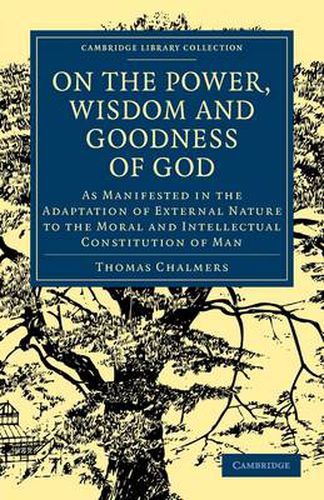Readings Newsletter
Become a Readings Member to make your shopping experience even easier.
Sign in or sign up for free!
You’re not far away from qualifying for FREE standard shipping within Australia
You’ve qualified for FREE standard shipping within Australia
The cart is loading…






The eight Bridgewater Treatises of the 1830s aimed to contribute to an understanding of the world as created by God. This, the first treatise, by the Scottish mathematician and churchman Thomas Chalmers, proposes an ‘argument for the character of the Deity, as grounded on the laws and appearances of nature’. It sees harmonies between the intellectual and material worlds as manifesting the hand of God in their creation, anticipating aspects of today’s ‘intelligent design’ theory. Volume I includes chapters comparing virtuous and vicious personalities; the concept of habit; how external nature is adapted to man’s moral constitution; and how moral and intellectual aspects of mankind lead to the civil and political well-being of society. Volume II provides specific examples of God’s design including happiness and the connection between intellect, emotion and will, concluding that areas left as open questions by science’s lack of proof are indications of divine architecture.
$9.00 standard shipping within Australia
FREE standard shipping within Australia for orders over $100.00
Express & International shipping calculated at checkout
The eight Bridgewater Treatises of the 1830s aimed to contribute to an understanding of the world as created by God. This, the first treatise, by the Scottish mathematician and churchman Thomas Chalmers, proposes an ‘argument for the character of the Deity, as grounded on the laws and appearances of nature’. It sees harmonies between the intellectual and material worlds as manifesting the hand of God in their creation, anticipating aspects of today’s ‘intelligent design’ theory. Volume I includes chapters comparing virtuous and vicious personalities; the concept of habit; how external nature is adapted to man’s moral constitution; and how moral and intellectual aspects of mankind lead to the civil and political well-being of society. Volume II provides specific examples of God’s design including happiness and the connection between intellect, emotion and will, concluding that areas left as open questions by science’s lack of proof are indications of divine architecture.